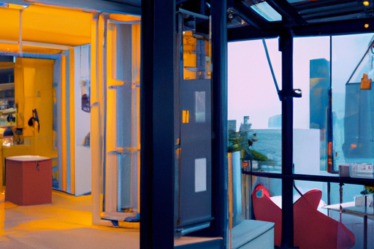
Dynamic Pricing: Revolutionizing Hotel Revenue Management
Innovations in Hotel Pricing by Duetto
Dynamic Pricing: Revolutionizing Hotel Revenue Management
Hotels have long been searching for ways to optimize their revenue management strategies. With the rise of online travel agencies and the increasing competition in the industry, it has become crucial for hotels to find innovative solutions to maximize their profits. One such solution is dynamic pricing, a revolutionary concept that is transforming the way hotels manage their pricing strategies.
Dynamic pricing, also known as demand-based pricing or surge pricing, is a pricing strategy that allows hotels to adjust their rates in real-time based on various factors such as demand, competition, and market conditions. This approach enables hotels to optimize their revenue by charging different prices for the same room at different times, depending on the demand and availability.
The traditional approach to hotel pricing involved setting fixed rates for different room types and seasons. However, this approach often led to missed opportunities and lost revenue. With dynamic pricing, hotels can now take advantage of fluctuations in demand and adjust their rates accordingly. For example, during periods of high demand, such as holidays or major events, hotels can increase their rates to maximize their profits. Conversely, during periods of low demand, hotels can lower their rates to attract more guests and fill their rooms.
One of the pioneers in dynamic pricing technology is Duetto, a leading provider of revenue management solutions for the hospitality industry. Duetto’s innovative platform uses advanced algorithms and machine learning to analyze market data and predict future demand. This allows hotels to make informed pricing decisions and optimize their revenue in real-time.
Duetto’s platform takes into account a wide range of factors when determining the optimal price for a room. These factors include historical data, competitor rates, market trends, and even weather conditions. By considering all these variables, Duetto’s platform can accurately forecast demand and recommend the best pricing strategy for each hotel.
The benefits of dynamic pricing are not limited to maximizing revenue. This approach also allows hotels to improve their guest satisfaction and loyalty. By offering competitive rates and personalized pricing, hotels can attract more guests and provide them with a better overall experience. Moreover, dynamic pricing enables hotels to offer targeted promotions and discounts to specific customer segments, further enhancing guest satisfaction and loyalty.
Another advantage of dynamic pricing is its ability to adapt to changing market conditions. In today’s fast-paced and unpredictable business environment, hotels need to be agile and responsive to stay competitive. With dynamic pricing, hotels can quickly adjust their rates to respond to changes in demand, competition, or any other market factors. This flexibility allows hotels to stay ahead of the curve and make the most of every revenue opportunity.
In conclusion, dynamic pricing is revolutionizing hotel revenue management by allowing hotels to optimize their pricing strategies in real-time. With the help of innovative technology like Duetto’s platform, hotels can accurately forecast demand, adjust their rates accordingly, and maximize their revenue. This approach not only improves financial performance but also enhances guest satisfaction and loyalty. As the hospitality industry continues to evolve, dynamic pricing will undoubtedly play a crucial role in helping hotels stay competitive and profitable.
Artificial Intelligence in Hotel Pricing: Enhancing Profitability

Innovations in Hotel Pricing by Duetto
Artificial Intelligence in Hotel Pricing: Enhancing Profitability
In today’s competitive hospitality industry, hoteliers are constantly seeking innovative ways to maximize profitability. One area that has seen significant advancements is hotel pricing, with the emergence of artificial intelligence (AI) technology. AI has revolutionized the way hotels set their prices, allowing them to optimize revenue and enhance profitability like never before.
AI-powered pricing solutions, such as those offered by Duetto, leverage machine learning algorithms to analyze vast amounts of data and make real-time pricing decisions. By considering various factors such as demand, competition, and customer behavior, these systems can accurately predict the optimal price for each room, maximizing revenue potential.
One of the key advantages of AI in hotel pricing is its ability to adapt to changing market conditions. Traditional pricing strategies often rely on historical data and manual adjustments, which can be time-consuming and less accurate. AI, on the other hand, continuously learns from new data and adjusts pricing in real-time, ensuring that hotels are always offering the most competitive rates.
Furthermore, AI-powered pricing solutions can also take into account external factors that may impact demand, such as weather events or local events. By analyzing these factors and their historical impact on bookings, AI can adjust prices accordingly, ensuring that hotels are well-positioned to capitalize on increased demand or mitigate potential losses during low-demand periods.
Another significant benefit of AI in hotel pricing is its ability to personalize rates based on individual customer preferences. By analyzing data on past bookings, customer behavior, and preferences, AI can offer tailored pricing options to different customer segments. This not only enhances the customer experience but also increases the likelihood of bookings and repeat business.
Moreover, AI-powered pricing solutions can also optimize revenue by offering dynamic pricing for ancillary services. By analyzing data on customer spending patterns and preferences, AI can determine the optimal price for additional services such as spa treatments, room upgrades, or dining options. This not only increases revenue but also enhances the overall guest experience by offering personalized and value-added services.
In addition to optimizing revenue, AI-powered pricing solutions can also help hotels reduce costs. By automating the pricing process, hotels can save time and resources that would otherwise be spent on manual adjustments and analysis. This allows hotel staff to focus on other important tasks, such as guest satisfaction and service delivery.
Furthermore, AI can also help hotels identify pricing trends and patterns that may not be immediately apparent to human analysts. By analyzing vast amounts of data, AI can uncover hidden insights and opportunities for revenue optimization. This allows hotels to stay ahead of the competition and make informed pricing decisions that drive profitability.
In conclusion, AI-powered pricing solutions have revolutionized the way hotels set their prices, enhancing profitability and optimizing revenue potential. By leveraging machine learning algorithms and analyzing vast amounts of data, AI can accurately predict optimal prices, adapt to changing market conditions, and personalize rates based on individual customer preferences. Additionally, AI can optimize revenue by offering dynamic pricing for ancillary services and help hotels reduce costs by automating the pricing process. With these innovations in hotel pricing, hoteliers can stay competitive in today’s dynamic hospitality industry and maximize profitability.
Personalized Pricing Strategies: Tailoring Hotel Rates to Individual Guests
Innovations in Hotel Pricing by Duetto
Personalized Pricing Strategies: Tailoring Hotel Rates to Individual Guests
When it comes to booking a hotel room, one size does not fit all. Every guest has different preferences, needs, and budgets. That’s why hotels are increasingly turning to personalized pricing strategies to offer tailored rates to individual guests. This innovative approach is made possible by the advanced technology and data analytics provided by companies like Duetto.
Gone are the days when hotels would simply set a fixed rate for all their rooms. With personalized pricing strategies, hotels can now take into account a variety of factors to determine the optimal rate for each guest. These factors include the guest’s booking history, loyalty status, length of stay, and even their willingness to pay. By analyzing this data, hotels can offer rates that are not only competitive but also customized to meet the specific needs of each guest.
One of the key benefits of personalized pricing strategies is that they allow hotels to maximize their revenue. By offering different rates to different guests, hotels can ensure that they are capturing the maximum value from each booking. For example, a business traveler who frequently stays at a particular hotel may be offered a discounted rate as a reward for their loyalty. On the other hand, a leisure traveler who is only staying for a weekend may be offered a higher rate, as they are likely to be less price-sensitive.
Another advantage of personalized pricing strategies is that they can help hotels to optimize their inventory. By analyzing historical data and demand patterns, hotels can identify periods of high demand and adjust their rates accordingly. For example, during peak travel seasons or major events, hotels can increase their rates to capitalize on the increased demand. Conversely, during periods of low demand, hotels can offer discounted rates to attract more guests and fill their rooms.
Personalized pricing strategies also benefit guests by offering them more flexibility and choice. Instead of being limited to a fixed rate, guests can now choose from a range of rates that best suit their needs and budget. This not only allows guests to save money but also ensures that they are getting the best value for their stay. For example, a guest who is willing to pay a higher rate may be offered additional perks such as a room upgrade or complimentary breakfast.
However, it is important to note that personalized pricing strategies should be implemented with transparency and fairness in mind. Guests should be made aware of the factors that are taken into account when determining their rate, and they should have the option to opt-out if they are uncomfortable with the data being used. Hotels should also ensure that their pricing strategies comply with all relevant laws and regulations to avoid any potential legal issues.
In conclusion, personalized pricing strategies are revolutionizing the hotel industry by allowing hotels to offer tailored rates to individual guests. By analyzing data and using advanced technology, hotels can maximize their revenue, optimize their inventory, and provide guests with more flexibility and choice. However, it is important for hotels to implement these strategies with transparency and fairness to ensure a positive guest experience. With innovations in hotel pricing by companies like Duetto, the future of personalized pricing looks bright for both hotels and guests alike.


